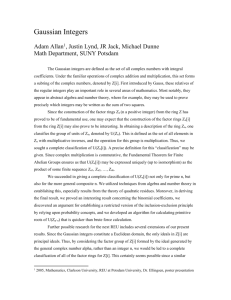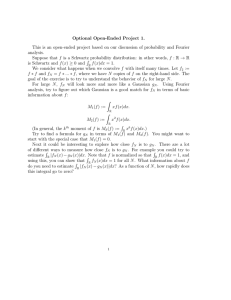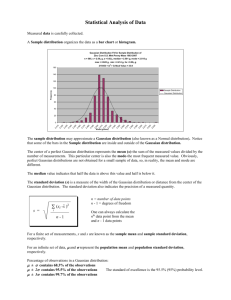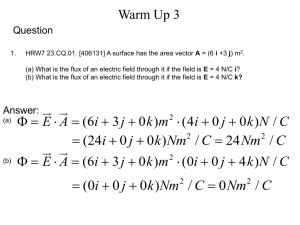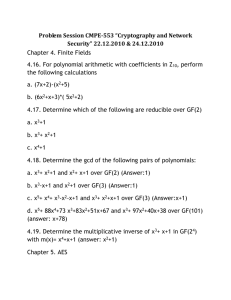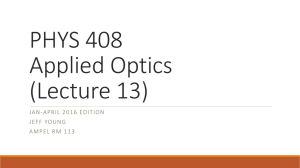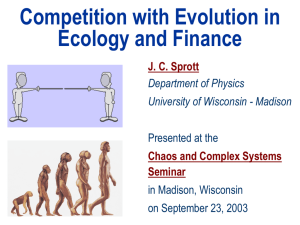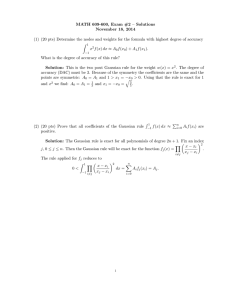Beitr¨ age zur Algebra und Geometrie Contributions to Algebra and Geometry
advertisement
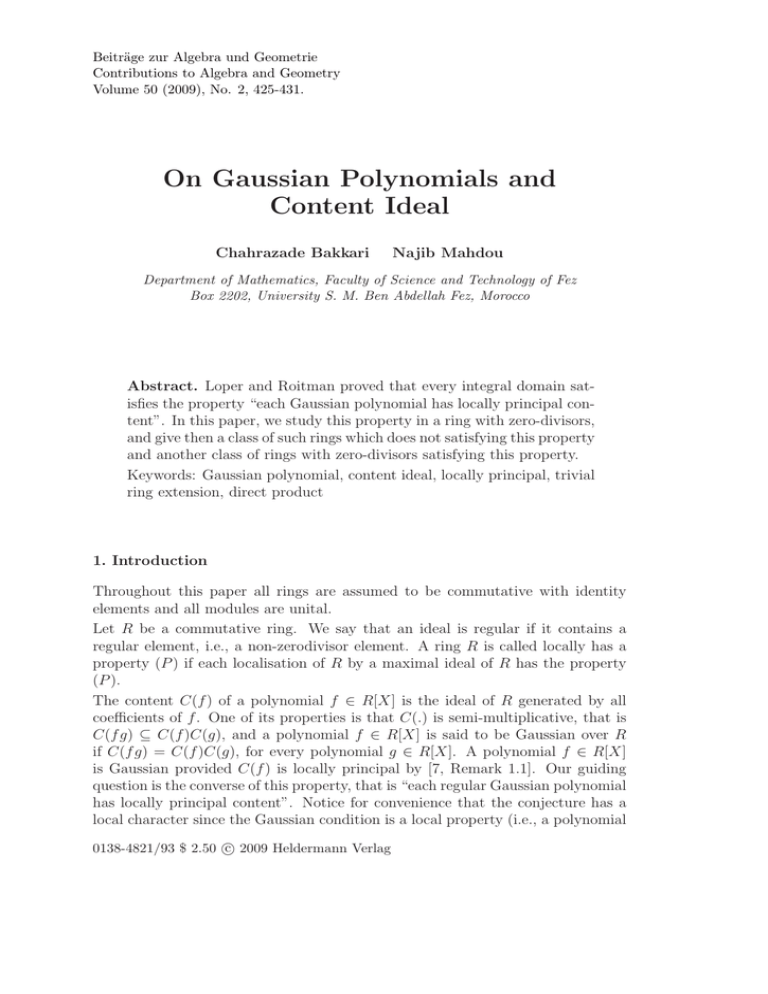
Beiträge zur Algebra und Geometrie
Contributions to Algebra and Geometry
Volume 50 (2009), No. 2, 425-431.
On Gaussian Polynomials and
Content Ideal
Chahrazade Bakkari
Najib Mahdou
Department of Mathematics, Faculty of Science and Technology of Fez
Box 2202, University S. M. Ben Abdellah Fez, Morocco
Abstract. Loper and Roitman proved that every integral domain satisfies the property “each Gaussian polynomial has locally principal content”. In this paper, we study this property in a ring with zero-divisors,
and give then a class of such rings which does not satisfying this property
and another class of rings with zero-divisors satisfying this property.
Keywords: Gaussian polynomial, content ideal, locally principal, trivial
ring extension, direct product
1. Introduction
Throughout this paper all rings are assumed to be commutative with identity
elements and all modules are unital.
Let R be a commutative ring. We say that an ideal is regular if it contains a
regular element, i.e., a non-zerodivisor element. A ring R is called locally has a
property (P ) if each localisation of R by a maximal ideal of R has the property
(P ).
The content C(f ) of a polynomial f ∈ R[X] is the ideal of R generated by all
coefficients of f . One of its properties is that C(.) is semi-multiplicative, that is
C(f g) ⊆ C(f )C(g), and a polynomial f ∈ R[X] is said to be Gaussian over R
if C(f g) = C(f )C(g), for every polynomial g ∈ R[X]. A polynomial f ∈ R[X]
is Gaussian provided C(f ) is locally principal by [7, Remark 1.1]. Our guiding
question is the converse of this property, that is “each regular Gaussian polynomial
has locally principal content”. Notice for convenience that the conjecture has a
local character since the Gaussian condition is a local property (i.e., a polynomial
c 2009 Heldermann Verlag
0138-4821/93 $ 2.50 426
C. Bakkari, N. Mahdou: On Gaussian Polynomials and Content Ideal
is Gaussian over a ring R if and only if its image is Gaussian over RM for each
maximal ideal M of R), [12, Lemma 5].
Significant progress has been made on this conjecture. Glaz and Vasconcelos
proved it for normal Noetherian domains [6]. Then Heinzer and Huneke established this conjecture over locally approximately Gorenstein rings and over locally
Noetherian domains [7, Theorem 1.5 and Corollary 3.4]. Recently, Loper and Roitman established the conjecture for (locally) domains [11, Theorem 4], and then
Lucas extended their result to arbitrary rings by restricting to polynomials with
regular content [12, Theorem 3.6]. Finally, in [1], by using pullbacks, the authors
construct a new class of rings that are not locally domains, nor locally Noetherians, and satisfy this conjecture. Let us note that Heinzer and Huneke, in [7,
Remark 1.6], give an example showing that the conjecture is false in general.
Let A be a ring, E be an A-module and R := A ∝ E be the set of pairs (a, e) with
pairwise addition and multiplication given by (a, e)(b, f ) = (ab, af + be). R is
called the trivial ring extension of A by E. Note that a prime (respectively, maximal) ideal of R has the form P ∝ E (respectively, M ∝ E) where P (respectively,
M ) is a prime (respectively, maximal) ideal of A (by [9, Theorem 25.1]).
Considerable work has been concerned with trivial ring extensions. Part of it has
been summarized in Glaz’s book [4] and Huckaba’s book (where R is called the
idealization of E by A) [9].
The goal of this work is to exhibit a class of rings (with zero-divisors) that does
not satisfy the property “each Gaussian polynomial has locally principal content”
and a second class of rings with zero-divisors satisfying this property. For this
purpose, we study the transfer of this property to trivial ring extension and direct
product.
2. Main results
This section develops a result of the transfer of the property “each Gaussian
polynomial has locally principal content” for a particular context of trivial ring
extensions. And so, we will construct a class of rings (with zero-divisors) that does
not satisfy the property “each Gaussian polynomial has locally principal content”.
Theorem 2.1. Let (A, M ) be a local ring which is not a field such that M 2 = 0
and let R := A ∝ E be the trivial ring extension of A by E, where E is a free
A-module. Then, R does not satisfy the property “each Gaussian polynomial has
locally principal content” in the following cases:
(1) rankA (E) = 1 and M is not principal,
(2) rankA (E) ≥ 2.
Before proving Theorem 2.1, we establish the following Lemma.
C. Bakkari, N. Mahdou: On Gaussian Polynomials and Content Ideal
427
Lemma 2.2. Let (A, M ) be a local ring which is not a field such that M 2 = 0 and
let R := A ∝ E be the trivial ring extension of A by E, where E is an A-module.
Assume that there exists a, b ∈ E −{0} such that M a = M b = 0 and the A-module
generated by {a, b} is not principal. Then, R does not satisfy the property “each
Gaussian polynomial has locally principal content”.
Proof. Under the hypothesis of Lemma 2.2, remark that R is local with maximal
ideal M ∝ E by [9, Theorem 25.1] since (A, M ) is local. Let f = (0, a) + (0, b)X ∈
R[X]. Our aim is to show that f is Gaussian and C(f ) is not (locally) principal.
We claim that f is Gaussian. Indeed, let g ∈ R[X]. We may assume that
g ∈ (M ∝ E)[X] (since if g ∈
/ (M ∝ E)[X], then C(g) = R and so C(f g) =
C(f )C(g)). Hence, C(f )C(g) = [R(0, a) + R(0, b)]C(g) ⊆ [R(0, a) + R(0, b)][M ∝
E] = 0 since aM = bM = 0 and so C(f g) = C(f )C(g) = 0 which means that f
is Gaussian.
We claim that C(f ) is not principal. Deny. There exists (c, d) ∈ R such that
C(f ) := R(0, a) + R(0, b)(= 0 ∝ (Aa + Ab)) = R(c, d) since R is local. Hence,
c = 0 and so Aa + Ab = Ad, a contradiction since the A-module generated by
{a, b} is not principal. Therefore, C(f ) is not locally principal and this completes
the proof of Lemma 2.2.
Proof of Theorem 2.1. Let (A, M ) be a local ring which is not a field such that
M 2 = 0 and let R := A ∝ E be the trivial ring extension of A by E, where E is
a free A-module.
1) Assume that rankA (E) = 1 and M is not principal. We may assume that
E = A. Hence, there exists m1 , m2 ∈ M − {0} such that m2 ∈
/ Am1 . Set
f = (m1 , 0) + (0, m2 )X ∈ R[X]. Our aim is to show that f is Gaussian and C(f )
is not (locally) principal.
n
X
We claim that f is a Gaussian polynomial. Let g =
(ni , ai )X i ∈ R[X].
i=0
If ni ∈
/ M for some i = 0, . . . , n, then ni is invertible in A and so (ni , ai ) is
invertible in R. Hence, C(g) = R and so g is Gaussian; thus C(f g) = C(f )C(g).
n
X
Assume that ni ∈ M for each i = 0, . . . , n. We have f g =
(m1 , 0)(ni , ai )X i +
n
X
(0, m2 )(ni , ai )X i+1 =
i=0
C(f g) =
n
X
n
X
i=0
(0, m1 ai )X i since m1 , m2 , ni ∈ M and M 2 = 0. Hence
i=0
R(0, m1 ai ). On the other hand, C(f )C(g)
i=0
n
n
n
X
X
X
= [R(m1 , 0) + R(0, m2 )][
R(ni , ai )] =
R(m1 , 0)(ni , ai ) =
R(0, m1 ai )
i=0
i=0
i=0
since m1 , m2 , ni ∈ M and M 2 = 0. Hence, C(f g) = C(f )C(g) and so f is
Gaussian.
428
C. Bakkari, N. Mahdou: On Gaussian Polynomials and Content Ideal
We claim that C(f ) is not principal (since R is local). Deny. Then C(f )(=
R(m1 , 0) + R(0, m2 )) = R(n, e) for some n ∈ M and e ∈ A and so (m1 , 0) =
(a, b)(n, e) for some (a, b) ∈ R.
If a ∈ M , then m1 = an = 0 since n ∈ M , a contradiction.
If a ∈
/ M , then a is invertible in A and so (a, b) is invertible in R. Hence,
R(m1 , 0) = R(n, e)(= R(m1 , 0) + R(0, m2 )) and so (0, m2 ) ∈ R(m1 , 0). Therefore,
(0, m2 ) = (a, b)(0, m1 ) = (0, am1 ) and so m2 ∈ Am1 , a contradiction. Therefore,
C(f ) is not (locally) principal.
2) Now, assume that rankA (E) ≥ 2. Let m ∈ M − {0}, (ei )i∈I be a basis of the
free A-module E, ai = mei ∈ E for i = 1, 2. We have M ai = 0 for each i = 1, 2
since M 2 = 0. We claim that the A-module generated by (ai )i=1,2 is not principal.
Assume that the A-module generated by (ai )i=1,2 is principal, that is Aa1 + Aa2 =
Ame1 + Ame2 = Af for some f ∈ E. Hence, f = b1 me1 + b2 me2 for some bi ∈ A,
where i = 1, 2. But, a1 ∈ Af implies that a1 (:= me1 ) = cf = cb1 me1 + cb2 me2
for some c ∈ A. Thus, m = cb1 m and cb2 m = 0 since (ei )i∈I is a basis of the free
A-module E. Therefore, (1 − cb1 )m = 0 and so 1 − cb1 ∈ M since (A, M ) is a
local ring and m 6= 0. Hence, cb1 ∈
/ M and so cb1 is invertible; in particular, c is
invertible.
Hence, the equation cb2 m = 0 implies that b2 m = 0 (as c is invertible) and so
b2 ∈ M (since (A, M ) is a local ring and m 6= 0). Hence, f = b1 me1 + b2 me2 =
b1 me1 as b2 , m ∈ M and M 2 = 0. But a2 (:= me2 ) ∈ Aa1 + Aa2 = Af implies that
me2 = df = db1 me1 for some d ∈ A; so m = 0 since (ei )i∈I is a basis of the free
A-module E, a contradiction as m 6= 0.
Therefore, the A-module generated by (ai )i=1,2 is not principal and Lemma 2.2
completes the proof of Theorem 2.1.
Remark 2.3. The hypothesis “M is not principal” in Theorem 2.1(1) is necessary. Indeed, let K be a field considered as a local ring with maximal ideal M = 0.
Hence, R := K ∝ K is a local ring with unique proper ideal R(0, 1)(= 0 ∝ K). So,
R satisfies the property “each Gaussian polynomial has locally principal content”.
The goal of the following result is to construct a second class of rings that does
not satisfy the property “each Gaussian polynomial has locally principal content”.
Proposition 2.4. Let (A, M ) be a local ring which is not a Bézout ring such that
M 2 = 0. Then A does not satisfy the property “each Gaussian polynomial has
locally principal content”.
Proof. It suffices to show that there exists a polynomial f ∈ A[X] such that C(f )
is not principal since A is local and Gaussian. For that, let’s consider a, b ∈ A
such that the ideal generated by {a, b} is not principal (since A is not a Bézout
ring). Set f = a + bX ∈ A[X]. Therefore, C(f ) := aA + bA is not principal and
this completes the proof of Proposition 2.4.
The next result gives a second wide class of rings that does not satisfy the property
“each Gaussian polynomial has locally principal content”.
C. Bakkari, N. Mahdou: On Gaussian Polynomials and Content Ideal
429
Corollary 2.5. Let (A, M ) be a local ring which is not a field such that M 2 = 0
and let R := A ∝ E, where E is a nonzero A-module such that M E = 0. Then
R does not satisfy the property “each Gaussian polynomial has locally principal
content”.
Proof. Remark that the ring R is local with maximal ideal M ∝ E which satisfies
(M ∝ E)2 = 0 since M 2 = 0 and M E = 0. Hence, each polynomial in R is
Gaussian. It remains to show that R is not Bézout by Proposition 2.4 (since
(M ∝ E)2 = 0).
Let a ∈ M − {0} and e ∈ E − {0}. We claim that the ideal I generated by
{(a, 0), (0, e)} is not principal. Deny. Assume that I := R(a, 0)+R(0, e) = R(b, h),
where (b, h) ∈ M ∝ E. We claim that b 6= 0.
Indeed, if b = 0, then (a, 0) ∈ I = R(0, h) which implies that a = 0, a contradiction. Hence b 6= 0.
But (0, e) ∈ I = R(b, h). Hence, (0, e) = (c, l)(b, h) = (cb, ch) for some (c, l) ∈ R
(since b ∈ M ). Then, cb = 0 and c ∈ M (since c ∈
/ M implies that c is invertible
and b = 0, a contradiction). Therefore, e = ch = 0, a contradiction. Then I is
not a principal ideal of R and so R is not a Bézout ring and this completes the
proof of Corollary 2.5.
Now, we will construct a wide class of rings satisfying the property “each Gaussian
polynomial has locally principal content”. For this, we study the transfer of this
property to finite direct products.
Theorem 2.6. Let (Ri )i=1,...,n be a family of rings. Then
n
Y
Ri satisfies the prop-
i=1
erty “each Gaussian polynomial has locally principal content” if and only if so does
Ri for each i = 1, . . . , n.
Before proving Theorem 2.6, we establish the following Lemma.
Lemma 2.7. Let R be a ring and, h : R → h(R) be a ring homomorphism, and
f be a Gaussian polynomial in R[X]. Then the homomorphic image of f is a
Gaussian polynomial in h(R)[X].
Proof. Let h : R → h(R) be a ring homomorphism, f be a Gaussian polynomial,
n
X
ai X i ∈ R[X]. Let’s remark first that,
and let g =
i=0
Ch(R) (h(g)) =
=
n
X
i=0
n
X
h(R)h(ai )
h(Rai )
i=0
n
X
= h(
Rai )
i=0
= h(CR (g)).
430
C. Bakkari, N. Mahdou: On Gaussian Polynomials and Content Ideal
Hence, we have (since f is Gaussian):
Ch(R) (h(f )h(g)) =
=
=
=
=
Ch(R) (h(f g))
h(CR (f g))
h(CR (f )CR (g))
h(CR (f ))h(CR (g))
Ch(R) (h(f ))Ch(R) (h(g)).
As desired.
Proof of Theorem 2.6. We will prove the result for i = 1, 2, and the theorem will
be established by induction on n. Let f = (f1 , f2 ) be a Gaussian polynomial in
(R1 × R2 )[X], and M be a maximal ideal of R1 × R2 . Then M = m1 × R2 or
M = R1 × m2 where mi ∈ Max (Ri ) for i = 1, 2.
We may assume that M = m1 × R2 (the case M = R1 × m2 is similar). We
wish prove that CR1 ×R2 (f )M is principal. But (R1 × R2 )M is naturally isomorphic
to (R1 )m1 and CR1 ×R2 (f )M is isomorphic to C(f1 )m1 . Therefore, CR1 ×R2 (f )M is
principal since f1 is supposed Gaussian by Lemma 2.7 and so R1 × R2 satisfies
the property “each Gaussian polynomial has locally principal content”.
Conversely, assume that the polynomial f1 is Gaussian in R1 [X] (it is the same
for f2 ). We easily check that f := (f1 , 0) is Gaussian in (R1 × R2 )[X]. Let
m1 ∈ Max (R1 ). Therefore, (CR1 ×R2 (f ))m1 ×R2 is principal since R1 × R2 satisfies
the property “each Gaussian polynomial has locally principal content”. Hence,
(CR1 (f1 ))m1 is principal (since (R1 × R2 )M is naturally isomorphic to (R1 )m1 and
CR1 ×R2 (f )M is isomorphic to C(f1 )m1 ), which means that CR1 (f1 ) is locally principal and this completes the proof of Theorem 2.6.
Now, we are able to construct a wide class of rings satisfying the property “each
Gaussian polynomial has locally principal content”.
Corollary 2.8. Let (Ri )i=1,...,n be a family of domains. Then
n
Y
Ri satisfies the
i=1
property “each Gaussian polynomial has locally principal content”.
Proof. By Theorem 2.5 and since every domain satisfies the property “each Gaussian polynomial has locally principal content” (by [11, Theorem 4]]).
Acknowledgements. The authors would like to express their sincere thanks
for the referee for his/her helpful suggestions and comments, which have greatly
improved this paper.
References
[1] Bakkari, C.; Mahdou, N.: Gaussian polynomials and content ideal in pullZbl
1101.13010
backs. Comm. Algebra 34(8) (2006), 2727–2732.
−−−−
−−−−−−−−
C. Bakkari, N. Mahdou: On Gaussian Polynomials and Content Ideal
431
[2] Bazzoni, S.; Glaz, S.: Prüfer rings in “Multiplicative Ideal Theory in Commutative Algebra”. In: J. W. Brewer (ed.) et al, Springer, New York 2006,
263–277.
Zbl
1115.13024
−−−−
−−−−−−−−
[3] Corso, A.; Heinzer, W.; Huneke, C.: A generalized Dedekind-Mertens lemma
and its converse. Trans. Am. Math. Soc. 350 (1998), 5095–5109.
Zbl
0903.13001
−−−−
−−−−−−−−
[4] Glaz, S.: Commutative coherent rings. Lect. Notes Math. 1371, SpringerVerlag, Berlin 1989.
Zbl
0745.13004
−−−−
−−−−−−−−
[5] Glaz, S.: The weak dimensions of Gaussian rings. Proc. Am. Math. Soc.
133(9) (2005), 2507–2513.
Zbl
1077.13009
−−−−
−−−−−−−−
[6] Glaz, S.; Vasconcelos, W.: The content of Gaussian polynomials. J. Algebra
202 (1998), 1–9.
Zbl
0923.13007
−−−−
−−−−−−−−
[7] Heinzer, W.; Huneke, C.: Gaussian polynomials and content ideals. Proc.
Am. Math. Soc. 125 (1997), 739–745.
Zbl
0860.13005
−−−−
−−−−−−−−
[8] Heinzer, W.; Huneke, C.: The Dedekind-Mertens lemma and the content of
polynomials. Proc. Am. Math. Soc. 126 (1998), 1305–1309. Zbl
0887.13005
−−−−
−−−−−−−−
[9] Huckaba, J. A.: Commutative rings with zero divisors. Marcel Dekker, New
York 1988.
Zbl
0637.13001
−−−−
−−−−−−−−
[10] Kabbaj, S.; Mahdou, N.: Trivial extensions defined by coherent-like conditions. Commun. Algebra 32(10) (2004), 3937–3953.
Zbl
1068.13002
−−−−
−−−−−−−−
[11] Loper, K. A.; Roitman, M.: The content of a Gaussian polynomial is invertible. Proc. Am. Math. Soc. 133(5) (2004), 1267–1271.
Zbl
1137.13301
−−−−
−−−−−−−−
[12] Lucas, T. G.: Gaussian polynomials and invertibility. Proc. Am. Math. Soc.
133(7) (2005), 1881–1886.
Zbl pre02150822
−−−−−−−−−−−−−
[13] Rotman, J. J.: An introduction to homological algebra. Academic Press, New
York 1979.
Zbl
0441.18018
−−−−
−−−−−−−−
[14] Rush, D. E.: The Dedekind-Mertens lemma and the contents of polynomials.
Proc. Am. Math. Soc. 128 (2000), 2879–2884.
Zbl
0974.13007
−−−−
−−−−−−−−
[15] Tsang, H.: Gauss’s Lemma. Ph.D. thesis, University of Chicago, Chicago
1965.
Received May 14, 2007
